
Medical Laboratory Professionals
Have you ever had your blood drawn, throat swabbed, biopsy, had a urine specimen collected? Have you ever wondered what happens to these specimens and how you get your results?
What do Laboratory Professionals Do?
Laboratory professionals play an important role in your health by detecting, diagnosing, treating and monitoring disease. They work in hospitals, clinics, doctor's offices, and reference labs and have undergone special training to produce quality results for patients.
Pathology Lab Careers 2025
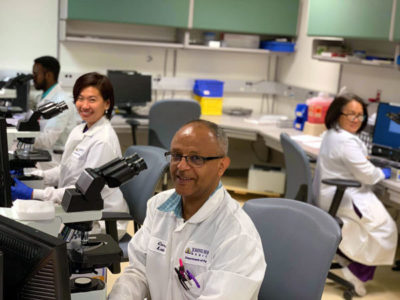
Meet a Medical Laboratory Professional
Working in a hospital laboratory, I touch the lives of hundreds of patients every day. Though they may never see my face or know my name, I make an impact on their lives.
I keep them calm while collecting blood when I know they are scared of needles. I am the one who discovers they are pregnant, determines that they are B Positive or have strep throat. I help your physician determine why you may be so tired—and that you need more iron or other vitamins in your diet. I am also the person whose heart sinks when we find cancer but who will be there monitoring how treatment is going.
Meet Medical Laboratory Professionals working at Johns Hopkins Pathology Core and Specialty Labs
Outlook for Laboratory Professionals
The need for laboratory professionals is expected to grow much faster than average employment, with a projected 5% growth between 2022 and 2032 with 24,000 openings each year. With population growth and aging, increased coverage of laboratory tests resulting from federal health care reform, and the development of new tests, the volume of laboratory tests is expected to increase.
(Citation: Bureau of Labor Statistics, Medical and Clinical Laboratory Technologists and Technicians. April 17, 2024.)
Questions about Laboratory Professional careers at Johns Hopkins can be directed to [email protected].
Become a Laboratory Professional
Is a career in the hospital laboratory right for you? Read about different roles in the laboratory. For each role, you will find links to training programs in Maryland.
Laboratory Aid or Lab Tech
Clinical Lab Technicians' main duties are processing samples which may include accessioning, receiving, aliquoting, and labeling samples. They may operate and maintain automated pre-analytical instrumentation, as well as participate in review of lab activities. Many are certified MLAs by American Society for Clinical Pathology (ASCP) or Medical Laboratory Assistant (CMLA) by American Medical Technologists. Laboratory Techs/Aides typically have:
- Completed high school or GED
- Received on the job training
Medical Laboratory Assistant programs in Maryland:
Phlebotomist (PBT)
Phlebotomists are allied healthcare professionals and work directly with patients. They are skilled in the art of collecting blood through venipuncture and skin puncture for laboratory tests and blood transfusions.
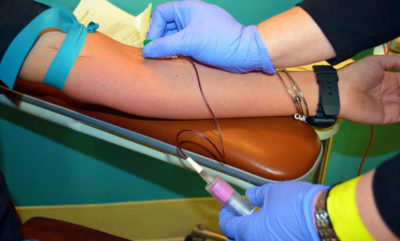
Phlebotomists typically have:
- Completed high school or GED
- Completed an accredited phlebotomy training program
- Collected blood from 100 patients
- Are certified phlebotomists
Johns Hopkins Medicine hosts student rotations from the following phlebotomy programs:
- Baltimore City Community College (BCCC)
- Community College of Baltimore County
Phlebotomist, Continuing Education Certificate - Mindful Practice Phlebotomy
- American Academy of Phlebotomy Technicians
Other Phlebotomy Certificate Programs in Maryland:
Medical Laboratory Technician (MLT)
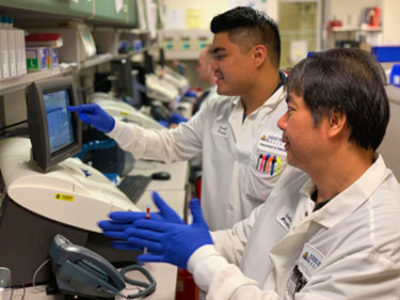
Medical Laboratory Technicians are allied healthcare professionals. They perform routine tests in the laboratory using microscopes, laboratory instruments and techniques. They are trained in the clinical laboratory where they can be generalists or specialize in an area:
- Blood Bank
- Core Lab (Clinical Chemistry / Hematology)
- Immunology
- Microbiology
Medical Laboratory Technicians typically have:
- Associate degrees
- Completed an accredited MLT training program
- Clinical rotation experience
- Many are certified MLTs by the American Society for Clinical Pathology (ASCP) Board of Certification (BOC), the American Medical Technologists (AMT), or the American Association of Bioanalysts (AAB) Board of Registry (ABOR).
Johns Hopkins Medicine hosts student rotations from the following MLT programs:
- Community College of Baltimore County
- Hillsborough Community College (All Children's Hospital)
Other MLT Programs in Maryland:
- Allegany College of Maryland
- Anne Arundel Community College (Sibley)
- College of Southern Maryland
- Northern Virginia Community College
Find a National Accrediting Agency for Clinical Laboratory Science (NAACLS) accredited program here.
Histologic Technician (HT, HTL)
Histologic Technicians are allied healthcare professionals. They play a crucial role in the diagnosis and treatment of disease by preparing body tissue samples for examination on microscope slides. The histologic technicians operate multiple instruments and work with many reagents and/or antibodies to assist in showing any tissue abnormalities. Once the slides are prepared the pathologist can render a diagnosis.
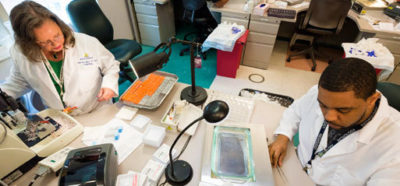
Histologic Technologists (HT, HTL) typically have:
- Associate or Bachelor degree
- Completed an accredited HT training program
- Clinical rotation experience
- Many are certified HTs by the American Society for Clinical Pathology (ASCP)
Johns Hopkins Medicine hosts student rotations from the following HT programs:
Other HT Programs in Maryland:
Find a National Accrediting Agency for Clinical Laboratory Science (NAACLS) accredited program here.
Histocompatibility Technologist (CHT, CHS)
Histocompatibility technologists perform testing that supports haematopoietic stem cell and organ transplantation to ensure compatibility between the donor and the recipient.
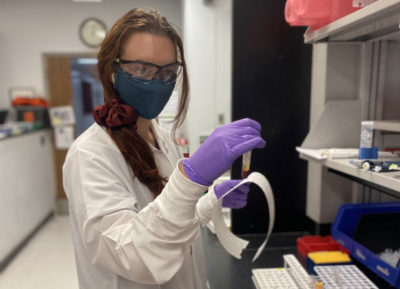
Histocompatibility Technologists (CHT) typically have:
- Bachelor's degree in chemical, physical, biological or clinical laboratory science
- One year experience in a histocompatibility laboratory
- Certified Histocompatibility Technologist (CHT) by American Society for Histocompatibility and Immunogenetics
- May have additional Certified Histocompatibility Specialist (CHS) certification
Laboratory Technologist (BB, C, H, M, MB)
Technologists in Blood Bank (BB), Chemistry (C), Hematology (H), Microbiology (M), and Molecular Biology (MB) perform routine and highly specialized tests in their specific laboratory discipline to diagnose and aid in the treatment of disease, troubleshoot instruments, and solve problems with lab results and patient specimens.
Technologists typically have:
- Bachelor's degree
- One year of clinical experience in the laboratory discipline or completion of a NAACLS structured program for discipline Certified technologists (BB, C, H, M, MB) by the American Society for Clinical Pathology (ASCP)
Johns Hopkins Medicine hosts student rotations from the following categorical programs:
- Andrews University - Online Interactive Certificate Programs
- Stevenson University - Categorical Certificate Training Program
Find a National Accrediting Agency for Clinical Laboratory Science (NAACLS) accredited program here.
Medical Laboratory Scientists (MLS)
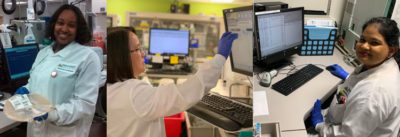
A Medical Laboratory Scientist (MLS) is an allied health professional who performs laboratory tests of varied complexity on blood and body fluids that are decisive in diagnosing and treating patients. MLS not only detects pathogens or determines anomalies but also tests what drugs work best against a particular organism and quantifies the concentration of drugs in the patient's blood to determine the efficacy of a particular drug. The safety of blood transfusions is determined by MLS determining the donor blood that is compatible with a recipient by performing rigorous laboratory testing.
MLS operates high-tech and artificial intelligence(AI)-driven automation and software to detect and quantify the constituents of blood or body fluids, directly correlating with how patient organs function. Such data is crucial for the goal of effective and better patient care.
The scope and skills of a medical laboratory scientist can go deep into a molecular level that comprises the extraction, amplification, and analysis of genetic information using highly versatile polymerase chain reaction (PCR) technology. The use of PCR for the modern development of vaccines is one example that is achieved through such a promising laboratory diagnostic method performed by MLS professionals and other researchers.
The field of Medical Laboratory Science provides several career and growth opportunities. Besides being a generalist, MLS can advance into leadership roles or specialize in the different areas that include but are not limited to specialties in Hematology, Chemistry, Blood Bank, Microbiology, and Molecular Biology. While performing such an incredible role in patient care, MLS generates vital laboratory data and has the potential for career growth opportunities in laboratory informatics, education, quality management, research, and laboratory leadership that conveniently fit MLS skills.
- Blood Bank
- Core Lab (Clinical Chemistry / Hematology)
- Immunology
- Microbiology
Educational Requirements:
- 4-year Bachelor's degree in medical laboratory science or life science (Biology, Chemistry, etc.)
- Completed an accredited MLS training program or have clinical rotation experience in a CLIA-accredited laboratory
- Certification: MT or MLS certification by the American Society of Clinical Pathology (ASCP), American Medical Technologists (AMT), or American Association of Bioanalysts (AAB)
- Individual discipline certifications (BB, C, H, M, MB) are available from the ASCP
- Specialist certifications (SBB, SC, SH, SM, SMB) are available from the ASCP
- Certification is not universally a requirement depending on the state and the institution but is highly recommended
Johns Hopkins Medicine hosts student rotations from the following MLS programs:
- Andrews University
- Howard University
- Morgan State University
- University of Cincinnati (Suburban)
- University of Delaware
- Stevenson University
- Salisbury University
- George Washington University (Suburban)
Find a National Accrediting Agency for Clinical Laboratory Science (NAACLS) accredited program here.
Graduate programs available for MLS:
- Master of Science in Medical Laboratory Science
- Master of Science in Clinical Laboratory Management
- Master of Science in Transfusion Medicine
- Specialist in Blood Bank Technology/Transfusion Medicine (SBBT/TM)
- Doctorate in Clinical Laboratory Science
Cytotechnologist (CT)
Cytotechnologists are allied healthcare professionals who prepare and examine cells from tissue and fluids under the microscope.
Cytotechnologists typically have:
- Bachelor's degree
- Completed an accredited CT training program
- Many are certified technologists by the American Society for Clinical Pathology (ASCP)
Find a Commission on Accreditation of Allied Health Education Programs (CAAHEP) accredited program here.
Specialist in Blood Bank Technology/Transfusion Medicine (SBBT/TM) Program
Specialists in Blood Banking are allied healthcare professionals. They perform advanced laboratory testing, product manipulation, and management of Transfusion Services.
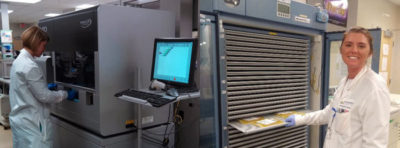
Specialists in Blood Banking typically have:
- Bachelor's degree in medical laboratory science or life science
- Completed an accredited MLS program
- Certified as a medical technologist (MT), medical laboratory scientist (MLS) or technologist in blood banking (BB)
- Three or more years of experience in a blood donor center or transfusion service or completed an accredited Specialist in Blood Banking program
- Certified as a SBB by the American Society for Clinical Pathology (ASCP)
Find other Commission on Accreditation of Allied Health Education Programs (CAAHEP) accredited programs here.
Pathologists' Assistant (PA)
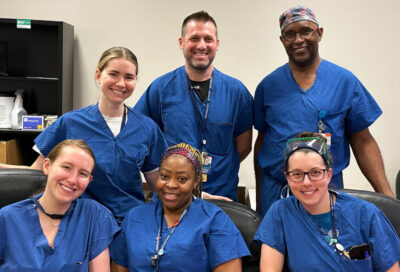
A pathologists' assistant (PA) is a certified allied healthcare professional that is trained to perform a multitude of tasks within the anatomic pathology department. Under the direction of an anatomic pathologist, a PA has a critical role in examining, measuring, and dissecting tissues/organs within a surgical pathology or autopsy pathology setting. Acting as a bridge between the patient's disease and diagnosis, a PA describes and selects samples of abnormal tissue from simple/complex dissections that then are processed and created into microscope slides, which the anatomic pathologist will use to provide a diagnosis. For complex cancer resections, the PA's description, measurements, and tissue sampling aid in the staging process, which directly influences patient treatment. For postmortem dissections, the PA's external examination and organ inspection/dissection help the pathologist determine the cause and manner of death.
PAs are also involved in the education and training of pathology residents, PA students, and shadowers. Laboratory management, safety operations, tissue banking for research, and a host of other responsibilities are also included within a PA's scope of practice.
Education Requirements:
- Bachelor's Degree
- Master's Degree in Pathology from an accredited PA Program
PAs receive their credentials through the American Society for Clinical Pathology (ASCP) after passing the certification exam.
There are 15 NAACLS Accredited PA Training Programs within the US and Canada.
Johns Hopkins Medicine hosts student rotations from the following PA programs:
- Anderson University (Suburban)
- University of Maryland
- Old Dominion University (Sibley & Suburban)
- Quinnipiac University
You can find more career information as a Pathologists' Assistant here, as well as information on other accredited programs.
Doctor in Clinical Laboratory Science (DCLS)
Doctor of Clinical Laboratory Science (DCLS) is a terminal degree for Medical Laboratory Scientists (MLS). DCLS are MLS trained to be a consultant for the interprofessional health care team to recommend diagnostic laboratory testing based on research evidence to improve patient outcomes. The Center for Medicare and Medicaid Services now recognizes the DCLS degree as a valid qualification for high-complexity laboratory directors.
DCLS Programs:
Pathologist
Pathologists are medical doctors that have specialized training to diagnose and characterize diseases. Pathologists oversee Anatomic Pathology (AP) or Clinical Pathology (CP) laboratories.
Visit the Department of Pathology Training Programs website »
Certification Websites
Professional Websites
- American Association of Bioanalysts
- American Society for Cytopathology
- American Society for Hematology
- American Society for Microbiology
- Association for Diagnostics & Laboratory Medicine
- Association for the Advancement of Blood and Biotherapies (AABB)
- College of American Pathologists
- Lab Tests Online
- National Society of Histotechnology
- The American Society for Clinical Laboratory Science
